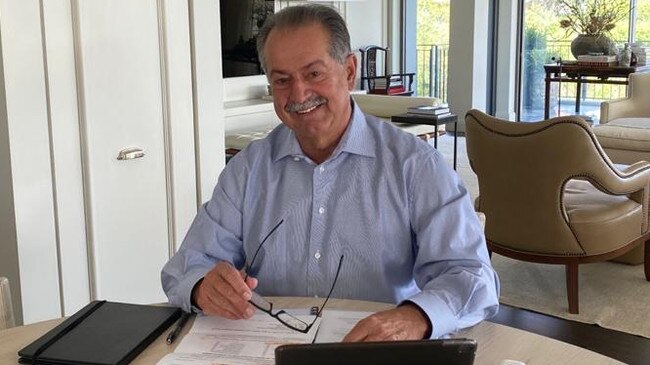Natural gas ‘our silver bullet’
Australia is on a ‘wartime footing’ and needs to focus on local production to see out the corona crisis, warns Andrew Liveris.

Australia needs to brace itself for a “lost year” in 2020 that could involve an economic downturn lasting most of the year as it battles the COVID-19 crisis, former Dow Chemical chief executive Andrew Liveris warns.
In an interview with The Australian from his apartment in the eastern suburbs of Sydney, the Darwin-born Liveris, who retired as executive chairman of the merged DowDuPont in 2018, said governments, global institutions and companies were now on a “wartime footing”.
He says there is an optimistic scenario which sees China coming out of its COVID-19 crisis, getting its economy back to work, and the world recovering from the virus and downturn.
“I consider that to be a very optimistic scenario,” he says.
“Everyone is planning for a dramatic downturn in the second quarter as a result of the lay-offs and the disruption to supply chains. The downturn will last two to three quarters as a base case — that is assuming the virus gets under control and the stimulus packages work.
“Economically, we are going to be restructuring for most of the year. It’s going to be a lost year.”
He says there is also a pessimistic scenario which sees the virus dampened but only to re-emerge, and the potential for a more serious global credit crisis.
Liveris, who is currently a director of IBM, WorleyParsons, petroleum giant Saudi Aramco and NOVONIX, says the crisis is also a lesson for Australia not to put all its eggs in the China basket.
He says Australia should now make a concerted effort to become more self-sufficient in areas including food, energy, healthcare equipment and some areas of manufacturing. “We need to debate the balance between what we have in our country and what we import,” he says.
“Can we import 80 per cent of our essentials and make only 20 per cent here?
“Under stable conditions probably, but in a crisis, should we invert that and make it 80 per cent locally produced and only 20 per cent imported?
“It’s less about picking winners and losers and more about a national framework which says, ‘I live in a world where I can’t rely on my global supply chains. I should reduce my dependency on China. I should diversify away from one sector’.”
He says the global coronavirus crisis is another example of “the true effects of globalisation”: “If a butterfly flaps its wings in China, you get a tsunami in Japan.”
He says there has already been reactions to globalisation with a loss of jobs in the developed world leading to a rise in economic nationalism.
He expects this will accelerate in the wake of the COVID-19 crisis as countries respond to concerns about having local supplies of essential goods.
Liveris says the world is “going to be on a lower GDP rate now for some quarters”.
“It’s not going to be a V-shaped downturn. It is going to be a U-shaped downturn with an extended flat part in the middle.”
Liveris says he has experienced crises in the past including 9/11 in America and the global financial crisis of 2008 and 2009, but has never gone through something like the current one.
“I have never seen anything like this,” he says. “The one thing in common with all of us is that we don’t know.”
Liveris led Dow through its own crisis in 2008 and 2009, when it had to go through with the $US16bn ($26bn) acquisition of chemical company Rohm and Haas after its proposed partner, Kuwait’s Petrochemical Industries, pulled out of its commitment to stump up $US9bn.
He says corporations need to respond to the crisis by doing intensive scenario planning of options ranging from the most optimistic case to the worst case.
“My training over many decades is that you have to do scenario planning like never before.”
He says the leaders facing crises need to project a sense of calmness, regardless of what they felt themselves.
He says business and governments need to work together in a wartime fashion to keep the economy going. “We need to keep supply chains open to make sure we are delivering food and essential items,” he says.
Liveris gives the Morrison government “high marks” for its handling of the crisis. But he says while there are some issues — such as border controls — which need to be handled by the federal government, other issues can be better handled at state or local government level. He says people also need to respond by obeying the rules, but adds it is also a time to have a sense of community and to show civility to others.
Liveris says Australia needs to increase self-sufficiency, including developing its domestic gas industry. “If you want some shovel-ready things to do, I would look to the energy and gas area,” he says. “Natural gas can be our silver bullet. We have an abundance of gas. We can have gas storage and generation and transmission. We could put together a plan within minutes and execute it in a few months and get more gas supply in a year.”




To join the conversation, please log in. Don't have an account? Register
Join the conversation, you are commenting as Logout